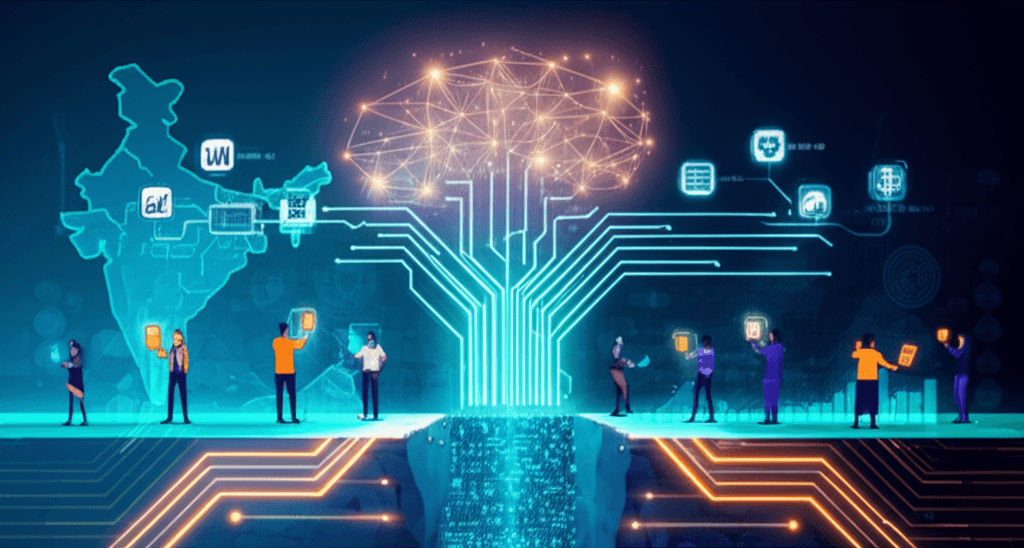99% Indian Companies Target GenAI Hires for 2025, Reshaping Job Market
Amidst an unprecedented hiring boom, India confronts its vast AI skill deficit by revolutionizing recruitment and upskilling its workforce.
June 19, 2025

A staggering 99% of Indian companies are set to hire for generative AI-related roles in 2025, signaling a monumental shift in the country's job market. This aggressive push towards integrating artificial intelligence comes despite a significant and widely acknowledged skill gap, creating a complex and challenging landscape for both employers and the workforce. The hiring frenzy underscores the perceived strategic imperative of adopting GenAI, with nearly all Indian employers believing these skills will provide a competitive advantage. This widespread consensus is forcing a rapid evolution in hiring practices, corporate strategies, and national skill development initiatives as India races to harness the transformative potential of AI.
The chasm between the demand for and supply of AI-proficient professionals is stark. A recent report from Quess Corp highlights a massive 51% demand-supply gap in India's AI talent ecosystem, even as the talent pool grew to 416,000 professionals in 2025.[1][2] This talent shortage is so acute that in emerging fields like GenAI engineering, there is only one qualified professional for every ten open roles.[1][2] The situation has led to a dramatic change in hiring philosophy, with a Coursera report revealing that 99% of Indian employers are now adopting or exploring skills-based hiring to combat talent shortages.[3] In a striking testament to this shift, 79% of employers stated they would prefer a less experienced candidate with a GenAI micro-credential over a more experienced one without it.[3][4] This highlights a clear pivot from prioritizing traditional qualifications to valuing verifiable, job-specific skills, particularly in the fast-evolving AI domain.
The demand for GenAI expertise is reshaping job roles and commanding significant salary premiums. In-demand positions include Data Scientists, Machine Learning Engineers, AI Developers, and AI Researchers, with a growing need for AI Product Managers who can bridge the gap between technical models and business impact.[2] The skills that are most sought after include proficiency in Python, frameworks like TensorFlow and PyTorch, Natural Language Processing (NLP), computer vision, and cloud technologies.[1] This demand has led to a notable salary surge, with entry-level AI professionals earning between ₹8–12 LPA, and specialists with 5–8 years of experience commanding salaries in the ₹25–35 LPA range.[1][2] The Banking, Financial Services, and Insurance (BFSI) sector is currently the largest driver of this demand, accounting for 24% of the total, followed by IT Services and Healthcare.[1][2] While major tech hubs like Bengaluru, Delhi NCR, and Hyderabad continue to lead in AI hiring, Tier-2 cities such as Kochi, Ahmedabad, and Coimbatore are emerging as new talent centers, contributing 14–16% of the overall demand.[1][2]
Addressing this critical skill deficit has become a national priority, involving a concerted effort from the government, private industry, and educational institutions. Recognizing the urgency, the Indian government approved the IndiaAI Mission in March 2024 with a substantial budget of over ₹10,000 crore to bolster computing infrastructure and support AI startups.[5] The private sector is also making significant contributions, with Microsoft planning to train 10 million Indians in AI by 2030.[5] Companies are increasingly looking inward, with 97% open to upskilling their existing workforce using micro-credentials.[3] Collaborative efforts are seen as pivotal, with calls for partnerships between companies and academic institutions to create specialized GenAI programs, internships, and workshops.[6][7] This multi-pronged approach, combining public-private partnerships, AI-focused curricula, and accessible upskilling programs, is deemed essential to bridge the gap and prepare the workforce for an AI-driven future.[6]
The long-term implications of this hiring trend are profound, positioning India at a critical juncture in its journey to become a global AI powerhouse. The successful integration of GenAI is projected to transform 38 million jobs by 2030, potentially boosting the nation's productivity by 2.61%.[8][9][10] An EY report indicates that GenAI could automate 24% of tasks across industries and augment another 42%, freeing up significant time for workers to focus on more strategic activities.[11][8][9] However, realizing this potential is entirely dependent on successfully reskilling and upskilling the workforce. The challenge is not just technical; it also involves fostering soft skills like critical thinking, problem-solving, and adaptability to complement AI-driven automation.[6] The race to hire for GenAI roles in 2025 is more than a recruitment trend; it is a clear indicator of a fundamental economic and industrial transformation that will define India's future growth and its position in the global technology landscape.
Sources
[1]
[5]
[7]
[8]
[9]
[11]